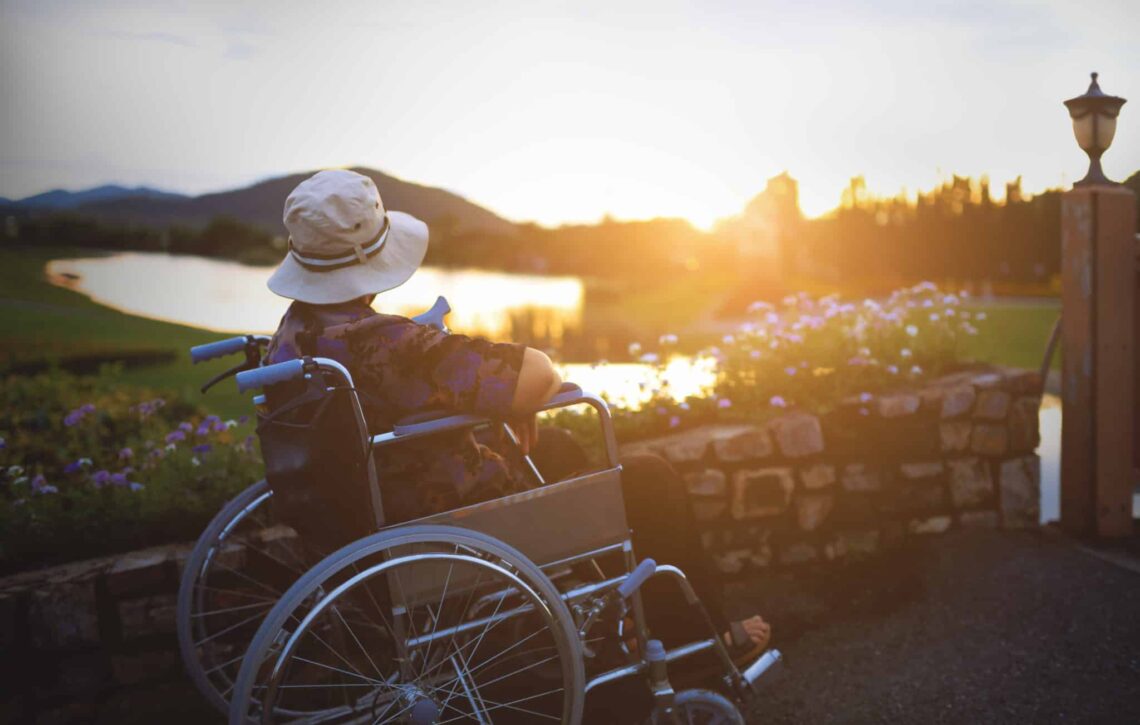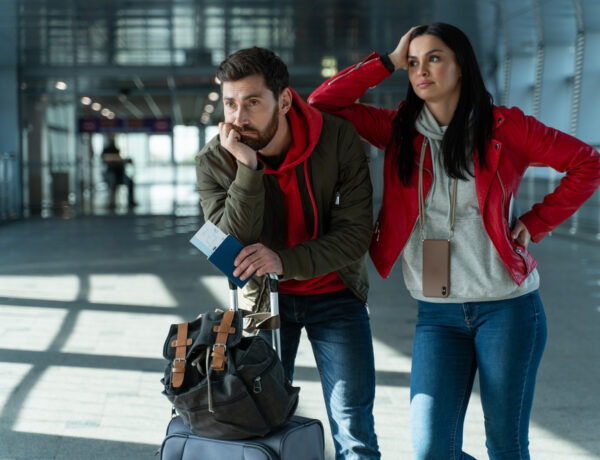When it comes to travel, often we can put up barriers (in the form of excuses) around us. We say we can’t afford a vacation. We self-doubt and think we don’t deserve the time away. But what if you were bound to a wheelchair? What then – would you wallow in self pity and decide that because of the difficulties, you’d just not go anywhere rather than suffer the hassles of the real world?
If you have barriers, whether they’re real or just in your head – and we all have some kind barrier or fear – then today’s guest will be either a breath of fresh air or a smack in the face. Tim Musick is bound to a wheel chair. Has been his whole life. But with the help and support of his father, Darryl, and others, he is out seeing the world, having some amazing travel experiences, and by the sounds of it, having the time of his life. Listen and learn from today’s inspiration…
Could you introduce yourselves?
Darryl: My name is Darryl Musick and I produce a blog called The World on Wheels, which is dedicated mostly to chronicling our travels and, to a lesser extent, our life in general. It is based on how we deal with having a son who is disabled and uses a wheelchair. I have been married to my lovely wife Letty for 24 years and have been father to Timothy for 23. We live just outside of Los Angeles, California.
Tim: My name is Tim Musick. l’m Darryl’s son. I graduated from the University of La Verne last year and am currently looking for work as a voiceover artist and broadcaster. I also have a sports blog.
A lot of people put up barriers to travel whereas you have a real physical barrier put in front of you. Tim’s been disabled from birth, but have you always been a traveller or did something shift recently? Tell us a bit more about how you got to where you are now with regards to travel.
Darryl: I’ve always been a traveler. My parents would take my sister and I on all kinds of trips, mainly loading up the car and heading up to places like Yosemite or Yellowstone, almost always camping. It wasn’t until I was 15 when they actually took us on a trip that required an airplane. We went to Hawaii and had a blast.
Before we learned of Tim’s disability (he was diagnosed with Cerebral Palsy at 8 months), I led an active life style. I skiied 2 to 3 times a week in the winter, rode motorcycles, went hiking and camping, biking, and more. Once we learned we had a kid with disabilities, those things started taking a back seat to therapy sessions, doctor visits, dealing with social workers, and the like. Also, I had dreamed of introducing my passions to my son and this was mostly not possible. It’s not safe to have him ride on the back of a motorcycle when he can’t hold on, for instance. We tried adaptive skiing but the cost is prohibitive making it a very rare occurence. We tried hiking and camping, but Tim just turned out not to be a back-to-nature kind of person. One thing that we all found out that we could enjoy equally is traveling. I’d always liked to travel, my wife had done relatively litte travel but was anxious to see the world, and Tim found out he loves to travel and try out new worlds and cultures.
As he’s grown and become harder to manage, I started to look into what I could do to make traveling easier and found there was actually very little out there back in the early 1990’s. I thought it would be helpful if things we found on our journeys that made it easier to travel with a disabled person could be shared with others so they could have the information that I originally sought. I started our original website on Geocities back in 1995, just chronicling our trips, sharing what worked, what didn’t, what we liked, and what we didn’t like. I let that site go when Tim went to college because I just didn’t have the time or inclination to do it anymore while I was helping him with things like transcribing homework, getting him ready, and getting him to school. Once he was out, we took a long vacation to Europe and I thought that this would be a good time to get back in the game, so I restarted the site as a blog…which is way easier to maintain than a website…and started over with new trip reports while also porting over the old ones from the original site.
Tim: As long as I can remember, I’ve been a traveler. Being born in this family, I learned early on that we are travelers. It’s just something, for me, that we’ve done all my life. I really enjoy it.
Do you find that because of Tim’s condition, do you get more hospitality on the road (I hate to say the “feel sorry” syndrome but I think you know what I mean) or do you find people in general to be un-accomodating?
Darryl: Frequently. People do see Tim in the chair and go out of their way to be nice and accomodating. Some places, many in Europe for example, it is policy. For example, if you’re visiting the Louvre in Paris in a chair and a security guard sees you, you will be automatically pulled out of line and ushered to the entrance where you will get in for free. The same thing happens when you queue up to see the Mona Lisa. Many places will have a discount for the disabled person and allow a carer to go along free.
Sometimes, it can be the opposite. I hate to use a French woman as an example because, other than her, I’ve found the people in France to be quite friendly and helpful…the opposite of the stereotype that exists…but it serves as an example. We were going to take a day trip from Cannes to the Isles de Lerin, just offshore, which requires a ferry ride. The ticket booths are up a flight of stairs but we say a blue handicap sign pointing to the end of the pier where a security guard sat in front of a lift. I asked him if it would be ok to take Tim up and he said yes. We went up to the booth where my wife was waiting and she had bought the tickets. We were going to get on the boat when a lady that worked there said it was not OK that we went up the lift and insisted that I carry my son (and his chair) back down the stairs and then back up before we could board. This is because we violated some sense of security (this is a post 9/11 trip) and everyone was required to go that way…disabled or not. We argued, ever heatedly about it. Other employees came out and told her she should back off, but she wouldn’t. I simply wheeled Tim onto the ferry and invited her to have the police arrest us if she liked but that was the end of it. So, long story short, yes…sometimes people can be un-accomodating…that’s just one example.
Tim: Let’s just say that it works to my advantage sometimes, even though I don’t want people to feel sorry for me. If someone offers me a discount or the ability to skip a line, I’ll take it. In general, I don’t find people to be unaccomodating. Sometimes they are, but not very often.
On a similar note, how do you choose your travel experiences? Do you find stuff that interests you and then worry about the logistics later, or does the disability have to take front and centre?
Darryl: Depends, but disabiltity is always considered before making any decisions. Sometimes, we’ll just see what destinations are bargains at the given time. Others, we may have a destination in mind that we’ve always wanted to see. We get together as a family, spit out a few options, and then pick from there. Once we’ve chosen a destination, I start researching to see if it is feasible. The Internet has made this much easier. I’ll lookup local transit agencies and check out their accessibility and if they go where we want to go. This has made it easy to book hotels next to accessible subway stations in places like New York, London, and Chicago. Hotel websites are gradually getting better, for example I tend to stay at Marriott properties because they allow you to guarantee a wheelchair accessible room online. Attractions usually have websites and most will have something on there that tells you if and how a disabled person can visit. We found an ancient castle with wheelchair access in Ireland this way.
Sometimes a destination doesn’t seem to work but will when you plan for it.
Puerto Vallarta was one of our favorite places for a few years. It is not anywhere near what we would call accessible here in the states but we got by. We would take a light-weight manual chair (as opposed to the power chair that weighs over 300 pounds) which would allows us to navigate over short stretches of stairs. Sometimes my wife’s brothers would come along adding some brute lifting power when needed.
We’ve also found that people there are very eager to help when a situation arises. In Maui, a restaurant we wanted to go to had a flight of stairs to go up. The manager sent down two of the beefiest looking Hawaiian guys down to carry Tim and his chair up. In Mexico, the same thing. At a Jack the Ripper tour in London, the guide always found a barrier free route and made sure Tim was always in front.
Tim: A lot of times, it’s whatever is a good deal at the time. I’ve just planned my first trip, for this trip I decided I’d need a manual wheelchair because the transit at the places we’re going don’t always work for a power chair. I had to make sure our accomodations were accessible before I booked them, that tickets we needed for sports venues were for wheelchair seating, and had to notify the airlines that I needed assistance.
What’s been your most inspirational travel experience?
Darryl: It’s hard to pick one. Eating a champagne walnut sauce covered filet mignon at the outdoor terraces of El Set while the sun is going down, being serenaded by two wonderful musicians is an experience I’ll never forget. Walking out of Grand Central Station, seeing our first sight of Manhattan…the Chrysler building at night. Shooting pool with the locals at a pub on King Street in London. Exploring Roman ruins in France, imagining what is was like at the very spot you’re standing on 2,000 years ago. The bone chilling cold that you’ll only experience in Chicago. One of the best steaks you’ll ever eat at a bowling alley in Big Timber, Montana.
Tim: Seeing a game at the old Yankee Stadium just before they tore it down. Going on a helicopter ride over the Las Vegas Strip at night. Being let in on the sly at Fenway Park by the groundskeeper. A somber, but memorable one was being in London on July 7, 2005. Also, when we went to Munich, we went to the former Olympic Village to pay our respects and say a prayer where the Israeli athletes were taken hostage. The next day we went to Dachau, which will stay with me always.
Darryl: Yes. When we go somewhere, we cannot ignore the dark parts of the history. Dachau, to me, was a necessary stop in Munich but it is not a happy place…I had a feeling of intense sadness there and revulsion but I would not skip it. It’s kind of the same feeling I get when I visit the site of the World Trade Center in New York. Travel is not always happy.
What special things are coming up on your travel to do list?
Darryl: Soon, we’ll be embarking on a baseball trip. We do these occasionally because Tim has a goal of seeing all the major league stadiums. It’s good to have goals like that, it helps you to see more of the world. Tim can tell you more about this trip because it’s also the first trip he’s planned from scratch…usually I do all the planning, I wanted him to get the experience and see just how much goes into planning for a trip. I also want to get our feet wet in Asia. We haven’t been there yet, so maybe a trip to Singapore with a side trip to Bangkok. If that doesn’t work out, it might be South America for a Plan B.
Tim: The trip I planned will be to Ohio and Missouri to see baseball games. We’ll be seeing the Cincinnati Reds, the St. Louis Cardinals, and the Kansas City Royals. After this trip, I’ll have either 19 or 20 stadiums done out of 30. We’re going in just a few weeks.
For other (wanna-be) travellers reading who do have a disability of any kind, what is your message to them?
Darryl: You don’t know till you try…get out there and do it. Today, there are many people and specialized travel agents that will help make your trip a possible reality instead of a dream. Besides us, there are people like Candy Harrington, at EmergingHorizons.com, who specialize in providing travel information for people with disabilities. Start easy…maybe a domestic trip to somewhere you’ve always wanted to see here in the United States…and go from there.
Tim: As long as you have the mind set that nothing is going to get in your way, nothing is going to stop you from traveling.





No Comments